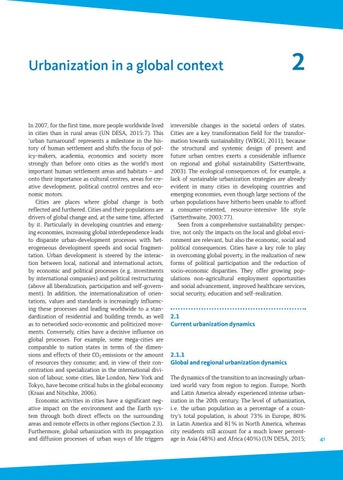Urbanization in a global context
In 2007, for the first time, more people worldwide lived in cities than in rural areas (UN DESA, 2015: 7). This ‘urban turnaround’ represents a milestone in the history of human settlement and shifts the focus of policy-makers, academia, economics and society more strongly than before onto cities as the world’s most important human settlement areas and habitats – and onto their importance as cultural centres, areas for creative development, political control centres and economic motors. Cities are places where global change is both reflected and furthered. Cities and their populations are drivers of global change and, at the same time, affected by it. Particularly in developing countries and emerging economies, increasing global interdependence leads to disparate urban-development processes with heterogeneous development speeds and social fragmentation. Urban development is steered by the interaction between local, national and international actors, by economic and political processes (e. g. investments by international companies) and political restructuring (above all liberalization, participation and self-government). In addition, the internationalization of orientations, values and standards is increasingly influencing these processes and leading worldwide to a standardization of residential and building trends, as well as to networked socio-economic and politicized movements. Conversely, cities have a decisive influence on global processes. For example, some mega-cities are comparable to nation states in terms of the dimensions and effects of their CO2 emissions or the amount of resources they consume; and, in view of their concentration and specialization in the international division of labour, some cities, like London, New York and Tokyo, have become critical hubs in the global economy (Kraas and Nitschke, 2006). Economic activities in cities have a significant negative impact on the environment and the Earth system through both direct effects on the surrounding areas and remote effects in other regions (Section 2.3). Furthermore, global urbanization with its propagation and diffusion processes of urban ways of life triggers
2
irreversible changes in the societal orders of states. Cities are a key transformation field for the transformation towards sustainability (WBGU, 2011), because the structural and systemic design of present and future urban centres exerts a considerable influence on regional and global sustainability (Satterthwaite, 2003). The ecological consequences of, for example, a lack of sustainable urbanization strategies are already evident in many cities in developing countries and emerging economies, even though large sections of the urban populations have hitherto been unable to afford a consumer-oriented, resource-intensive life style (Satterthwaite, 2003: 77). Seen from a comprehensive sustainability perspective, not only the impacts on the local and global environment are relevant, but also the economic, social and political consequences. Cities have a key role to play in overcoming global poverty, in the realization of new forms of political participation and the reduction of socio-economic disparities. They offer growing populations non-agricultural employment opportunities and social advancement, improved healthcare services, social security, education and self-realization.
2.1 Current urbanization dynamics
2.1.1 Global and regional urbanization dynamics The dynamics of the transition to an increasingly urbanized world vary from region to region. Europe, North and Latin America already experienced intense urbanization in the 20th century. The level of urbanization, i. e. the urban population as a percentage of a country’s total population, is about 73 % in Europe, 80 % in Latin America and 81 % in North America, whereas city residents still account for a much lower percentage in Asia (48 %) and Africa (40 %) (UN DESA, 2015;
41
